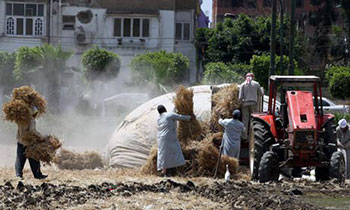Egypt is suffering its worst economic crisis since the Great Depression, a former finance minister of the country and one of its leading economists have warned, according to the Guardian.
In terms of its devastating effect on Egypt’s poorest, the country’s current economic predicament is at its most dire since the 1930s, Galal Amin, professor of economics at the American University in Cairo, and Samir Radwan, finance minister in the months after Egypt’s 2011 events, said in separate interviews with the Guardian.
Since the fall of Hosni Mubarak in 2011, Egypt has experienced a drastic fall in both foreign investment and tourism revenues, followed by a 60% drop in foreign exchange reserves, a 3% drop in growth, and a rapid devaluation of the Egyptian pound. All this has led to mushrooming food prices, ballooning unemployment and a shortage of fuel and cooking gas – causing Egypt’s worst crisis, said Amin, “without fear of making a mistake, since the 30s”.
“Nobody cares about the poor now,” Amin said. During comparable crises in the late 1960s, the mid-70s and the late 80s, Amin and Radwan argued that Egypt’s poorest were variously shielded from absolute hardship either by state subsidies, overseas aid, comparatively low unemployment, or by remittances from expatriates in the Gulf states. But now one in four young Egyptians is unemployed, household remittances are low, and there is a shortage of subsidized goods.
“You are talking about nearly half of the population being in a state of poverty,” said Radwan, a development economist. “Either in absolute poverty or near-poor, meaning that with any [economic] shock, like with inflation, they will fall under the poverty line.” Currently, 25.2% of Egyptians are below the poverty line, with 23.7% hovering just above it, according to figures supplied by the Egyptian government.
For most Egyptians, rising food prices are the most critical problem. Some goods have doubled in price since last autumn – catastrophic for the quarter of families that already spend 50% of their income on food.
For Hoda Goma, a Cairo architect, the situation is having a serious effect on her two eight-year-old sons. “They’re getting worse at school,” she said. “They’re getting ill more often. They have these black patches under their eyes and their teeth have got worse.”
It is down to their diet, Goma explained. She cannot afford to feed them what they need. Six months ago she spent half her salary on food. Now she says it is closer to four-fifths – not because she is earning less, but because rising food prices show no sign of slowing down.
“Prices are on fire,” said grocer Walid Ali. Just last week, Ali would buy a kilo of mandarins for four Egyptian pounds – or 40 British pence – from wholesalers, and sell them for six (60 British pence). “Now I buy them for six and sell them for eight.”
As a result, consumers are either buying less, or not buying at all. “It’s impossible,” said Ali. “I’ve lost half my customers. People can only afford to buy basic foods.” At his two-storey market in central Cairo, the top floor is now entirely empty. Neighbours said all stall-holders on the upper level had been forced to close in recent months.
Inflated food prices are not a new phenomenon in a country that is the world’s biggest importer of wheat, where the population has long risen more rapidly than production, and where up to half of the produce rots in the heat on the way to market. But the recent rate of inflation has been significantly raised by Egypt’s disastrous economic predicament.
Most problematically, the value of the Egyptian pound has fallen by 12% against the dollar since December. For two years, Egypt’s central bank had used its foreign currency reserves to arrest the slide – but with those reserves having shrunk by around 60% since 2011, the bank had to abandon the tactic last winter. As a result, the pound’s value has this year fallen further and faster. In turn, it has become much more expensive to import foreign goods – catastrophic for a country that buys in 60% of its wheat, and whose farmers also often rely on imported fertiliser, fuel and animal feed.
R.S

